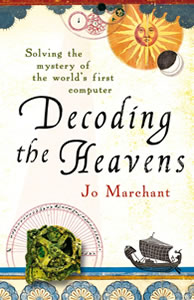
Great news... Decoding the Heavens has been shortlisted for this year's Royal Society Prize for Science Books - described as the world's most prestigious awards for science writing.
The judges said about it: "This is a rattling good detective story exploring a subject that we were amazed that we hadn't heard more about. Learning about the extraordinary capabilities of the ancient civilisations was fascinating and left us all wondering what other incredible pockets of knowledge have been lost at the bottom of the sea or otherwise forgotten."
As would be expected there are some fantastic other books on the shortlist - looks like an even split between three US academics and three UK journalists and biographers. I've pasted the rest of the line-up below, in case anyone's looking for some stimulating summer reading.
What the Nose Knows: The science of scent in everyday life by Avery Gilbert (Crown Publishers).
The judges said: "One of the things you really appreciate about this book is the feeling that you are in the presence of someone who really knows the subject. He's worked in the fragrance industry and in academic research and engagingly leads you into his fascinating world. Since reading this book we've all thought more about the scents around us and our oft-neglected sense of smell."
Bad Science by Ben Goldacre (Harper Perennial).
The judges said: "We found this book was funny, accessible and offered much more than just a collection of Ben Goldacre's excellent columns in the Guardian. He attacks and debunks pseudoscience, which is really vital given how much is out there and how important the issues are to our lives. There's more to be said about some of the subjects, like the MMR vaccine scandal, and we're looking forward to the sequel."
The Age of Wonder: How the Romantic generation discovered the beauty and terror of science by Richard Holmes (HarperPress).
The judges said: "We all thought this was a fantastic, enlightening and inspiring book, taking characters from the history of science and making them come alive. Richard Holmes has managed to seamlessly merge science, social history and literary history in a wonderful narrative, putting science in a wider context and producing a truly enthralling read."
The Drunkard's Walk: How randomness rules our lives by Leonard Mlodinow (Penguin).
The judges said: "This book is well-written, enlightening and very funny at times. We could see people reading it and finding their perspective of odds and probability being fundamentally altered - it definitely puts you off buying a lottery ticket or having a gamble on the roulette wheel!"
Your Inner Fish: The amazing discovery of our 375-million-year-old ancestor by Neil Shubin (Penguin).
The judges said: "This is a charming and delightful book; not often that a science book can be described in such terms! The author, an expert palaeontologist with a deep understanding of anatomy and animal development, still manages to explain things clearly, gracefully and eloquently - we all felt he'd be a great person to meet in the pub for a chat and a drink!"